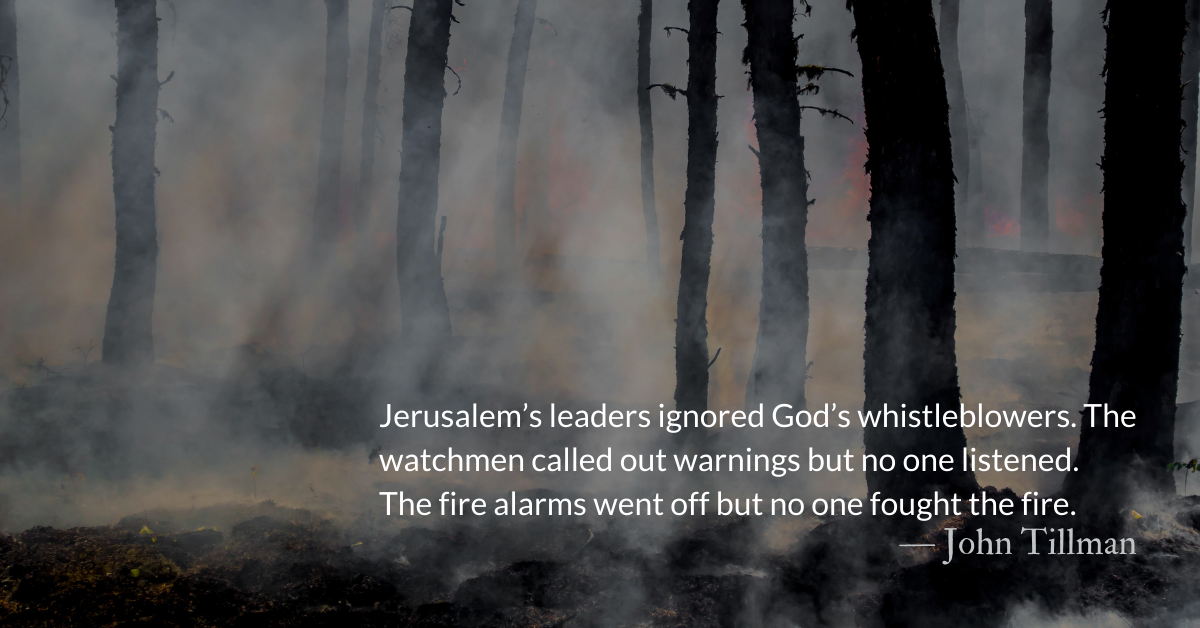Scripture Focus: Ezekiel 21.3-6; 25-27
This is what the LORD says: I am against you. I will draw my sword from its sheath and cut off from you both the righteous and the wicked. 4 Because I am going to cut off the righteous and the wicked, my sword will be unsheathed against everyone from south to north. 5 Then all people will know that I the LORD have drawn my sword from its sheath; it will not return again.’
6 “Therefore groan, son of man! Groan before them with broken heart and bitter grief.
25 “ ‘You profane and wicked prince of Israel, whose day has come, whose time of punishment has reached its climax, 26 this is what the Sovereign LORD says: Take off the turban, remove the crown. It will not be as it was: The lowly will be exalted and the exalted will be brought low. 27 A ruin! A ruin! I will make it a ruin! The crown will not be restored until he to whom it rightfully belongs shall come; to him I will give it.’
Reflection: A Sword Unsheathed
By John Tillman
The slashing sword God unsheathes may seem shocking. Isn’t God going overboard here?
There are some things to remember about passages of judgment like this.
Like many apocalyptic passages, these are poetically exaggerated for emphasis. The sword did not cut down every single human in Jerusalem. Even though the Babylonians went farther in violence than God intended them to (which he later punished them for: Isaiah 13.17-22; Jeremiah 50.1-16) there was not complete eradication.
The destruction of Jerusalem was brought by the destruction they wrought. Jerusalem was characterized primarily by violence and was ended by violence. (Matthew 26.52) Few people feel bad for the destruction brought to Nazi Germany after a good look at the destruction they wrought. When we look more deeply into the sins of Jerusalem, we will see its destruction as the justice of God, not an overreaction. We may also see sins we are familiar with in our own countries.
Over and over the prophets’ voices cried out God’s concerns. Powerful and wealthy leaders who represented God profaned his name through their abuses. Widows and orphans, the poor and the foreigner suffered under violence and abuse. The blood of the poor ran in the streets.
Jerusalem’s leaders ignored God’s whistleblowers. The watchmen called out warnings but no one listened. (Ezekiel 33.1-7) The fire alarms went off but no one fought the fire.
The righteous, although they suffered, were sealed, loved, and cared for even in the midst of the destruction. In a different vision (Ezekiel 9.3-4), God set a seal on those who lamented the wickedness around them. This seal did not prevent all physical harm or suffering. Instead, God’s seal was a guarantee that evil would work out for their good. (Genesis 50.20)
God’s good purpose for them would come through the destruction, the exile, the return, and ultimately, through Jesus. God promised to remove the kingship and to restore it only when one worthy of it came. We are the selfish kings, uncrowned. The worthy king we now must serve is Jesus.
As whistles blow and alarms of judgment sound in our cities, may we be those who the Spirit finds filled with lament not contempt.
May we cry against violence not cry for it.
May we end the suffering of the poor not endorse it.
May his unsheathed sword mercifully cut us away from the false political kingdoms we have served, that we may learn to serve the kingdom of Heaven.
Divine Hours Prayer: The Refrain for the Morning Lessons
Our sins are stronger than we are, but you will blot them out. — Psalm 65.3
– Divine Hours prayers from The Divine Hours: Prayers for Summertime by Phyllis Tickle
Today’s Readings
Ezekiel 21 (Listen – 5:29)
Psalm 68 (Listen – 4:26)
This Weekend’s Readings
Ezekiel 22 (Listen -4:58), Psalm 69 (Listen – 4:04)
Ezekiel 23 (Listen – 7:48), Psalm 70-71 (Listen – 3:29)
Read more about Lament the Fall of Leaders (Even Bad Ones)
But despite their words of judgment to the kings and rulers of Judah and Israel, both men deeply loved their country…
Read more about The Thriving Tree
Jesus, the king planted by God upon Zion, is the tree that will thrive, bringing all the birds to his shade.







